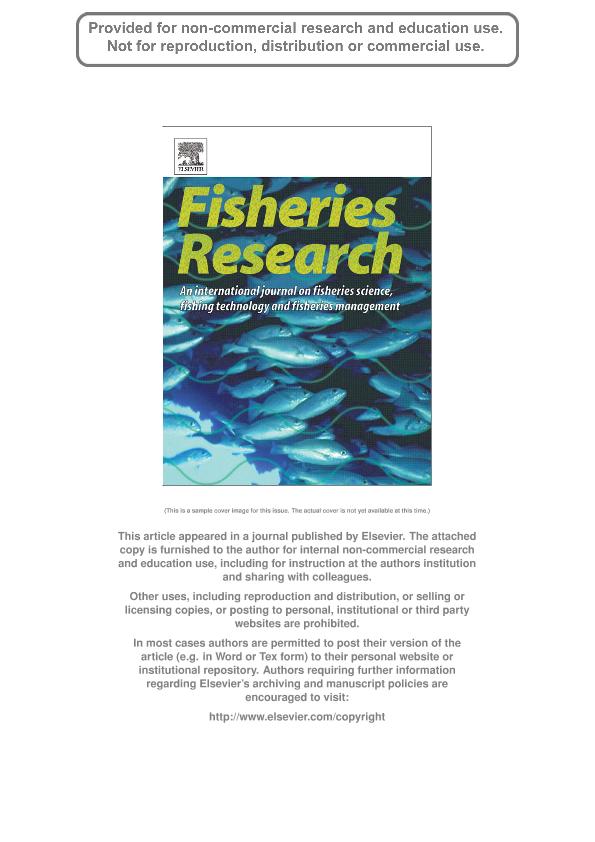Mostrar el registro sencillo del ítem
dc.contributor.author
Venerus, Leonardo Ariel

dc.contributor.author
Irigoyen, Alejo Joaquin

dc.contributor.author
Parma, Ana Maria

dc.date.available
2016-04-22T21:18:18Z
dc.date.issued
2013-01
dc.identifier.citation
Venerus, Leonardo Ariel; Irigoyen, Alejo Joaquin; Parma, Ana Maria; Assessment of biases in the estimation of tag shedding rates through a mark-resight experiment; Elsevier; Fisheries Research; 140; 1-2013; 133-148
dc.identifier.issn
0165-7836
dc.identifier.uri
http://hdl.handle.net/11336/5341
dc.description.abstract
Several flexible methods for estimating tag loss rates through mark-resight data have been developed recently. They allow evaluation of different tag shedding modalities and relax the usual assumption of independence between the loss of tags made in classical double-tagging methods. Two conditions limit the applicability of these methods: (1) tagged individuals must have permanent marks so that they can still be identified after losing their tags, and (2) a large number of observations is required to obtain precise estimates. Here we evaluate the performance of alternative estimators of tag shedding rates when these conditions are not met, a situation that is very common in mark-resight experiments on reef fishes. We simulated resighting data using a simple exponential model of tag shedding under different scenarios created by varying the probabilities of fish detection and fish emigration from the reef, and the tagging schedule. The model was conditioned on actual data from a short-term double-tagging study conducted on the Argentine sandperch Pseudopercis semifasciata(Cuvier 1829) in rocky reefs of northern Patagonia. We tested eight estimation procedures: three variants of an individual-based method, two based on a binomial likelihood function for exact or pooled times-at-liberty data, and three regression methods. Although the individual-based approach produced unbiased and most precise estimates when individuals that had lost both tags were identifiable, it performed poorly in the absence of permanent tags. In contrast, conditional methods, which do not require identification of individuals that have lost both tags, were more robust, providing unbiased and precise estimates. The pros and cons of the different methods for analyzing small-scale mark-resight experiments are discussed.
dc.format
application/pdf
dc.language.iso
eng
dc.publisher
Elsevier

dc.rights
info:eu-repo/semantics/openAccess
dc.rights.uri
https://creativecommons.org/licenses/by-nc-nd/2.5/ar/
dc.subject
Tag Loss Estimation Methods
dc.subject
Pseudopercis Semifasciata
dc.subject
Rocky Reef Fish
dc.subject
Small-Scale Tagging Studies
dc.subject.classification
Biología Marina, Limnología

dc.subject.classification
Ciencias Biológicas

dc.subject.classification
CIENCIAS NATURALES Y EXACTAS

dc.title
Assessment of biases in the estimation of tag shedding rates through a mark-resight experiment
dc.type
info:eu-repo/semantics/article
dc.type
info:ar-repo/semantics/artículo
dc.type
info:eu-repo/semantics/publishedVersion
dc.date.updated
2016-05-06 15:52:43.262787-03
dc.journal.volume
140
dc.journal.pagination
133-148
dc.journal.pais
Países Bajos

dc.journal.ciudad
Amsterdam
dc.description.fil
Fil: Venerus, Leonardo Ariel. Consejo Nacional de Investigaciones Científicas y Técnicas. Centro Nacional Patagónico; Argentina
dc.description.fil
Fil: Irigoyen, Alejo Joaquin. Consejo Nacional de Investigaciones Científicas y Técnicas. Centro Nacional Patagónico; Argentina
dc.description.fil
Fil: Parma, Ana Maria. Consejo Nacional de Investigaciones Científicas y Técnicas. Centro Nacional Patagónico; Argentina
dc.journal.title
Fisheries Research

dc.relation.alternativeid
info:eu-repo/semantics/altIdentifier/url/http://www.sciencedirect.com/science/article/pii/S0165783613000039
dc.relation.alternativeid
info:eu-repo/semantics/altIdentifier/doi/10.1016/j.fishres.2012.12.015
dc.relation.alternativeid
info:eu-repo/semantics/altIdentifier/doi/http://dx.doi.org/10.1016/j.fishres.2012.12.015
Archivos asociados
